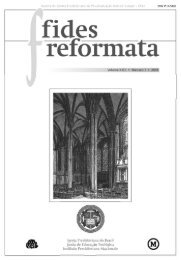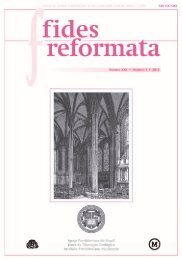Fides 22 N2
Um publicação do Centro Presbiteriano de Pós-graduação Andrew Jumper.
Um publicação do Centro Presbiteriano de Pós-graduação Andrew Jumper.
Create successful ePaper yourself
Turn your PDF publications into a flip-book with our unique Google optimized e-Paper software.
ELIAS MEDEIROS, THE REFORMERS AND MISSIONS<br />
the New Testament apostles,” and “the doctrine of election that made missions<br />
appear extraneous if God had already chosen those he would save.” 92 All of<br />
these arguments take less than one page of Tucker’s work.<br />
The Roman Catholic Counter-Reformation forced the Reformed churches<br />
to just hold “their own in the face of Roman Catholic opposition and breaking<br />
new ground in Europe.” 93 Therefore, the Reformers had “little time or personnel<br />
for overseas ventures.” 94 The Protestants lacked opportunities because<br />
the Roman Catholics had “dominated the religious scene in most of the seafaring<br />
nations.” 95 As for the para-church groups, “the Protestants did not have<br />
a ready-made missionary force like the Roman Catholic monastic orders.” 96<br />
According to Tucker, the reformers’ theological beliefs by practical<br />
implication cut any meaningful initiative of the Protestants toward missions.<br />
Without further explanation or comment regarding the available literature that<br />
has dealt with these theological arguments, Tucker reasons as follows:<br />
Martin Luther was so certain of the imminent return of Christ that he overlooked<br />
the necessity of foreign missions. He further justified his position by claiming<br />
that the apostles...had fulfilled their obligation [the Great Commission] by<br />
spreading the gospel throughout the known world, thus exempting succeeding<br />
generations from responsibility. [And] Calvinists generally used the same line of<br />
reasoning, adding the doctrine of election that made missions appear extraneous<br />
if God had already chosen those he would save. 97<br />
She makes all these statements without a single comment or reference to<br />
any primary, secondary, or even tertiary literature on the subject. At the end of<br />
chapter 3, “The Moravian Advance: Dawn of Protestant Missions”, in which<br />
less than one page is dedicated to the Reformation period, Tucker has a selected<br />
bibliography of six sources related to that chapter. Five of them are about the<br />
history of the Moravian church and mission and one is about the missionary<br />
work of Hans Egede in Greenland.<br />
Tucker does recognize that “Calvin himself was at least outwardly the<br />
most missionary–minded of all the Reformers.” She takes into consideration<br />
that Calvin “not only sent dozens of evangelists back into his homeland of<br />
France, but also commissioned four missionaries to establish a colony and<br />
evangelize the Indians in Brazil.” 98 It seems that Tucker had not read Jean<br />
92 Tucker, From Jerusalem to Irian Jaya, 67.<br />
93 Ibid.<br />
94 Ibid.<br />
95 Ibid.<br />
96 Ibid.<br />
97 Ibid.<br />
98 Ibid.<br />
160




